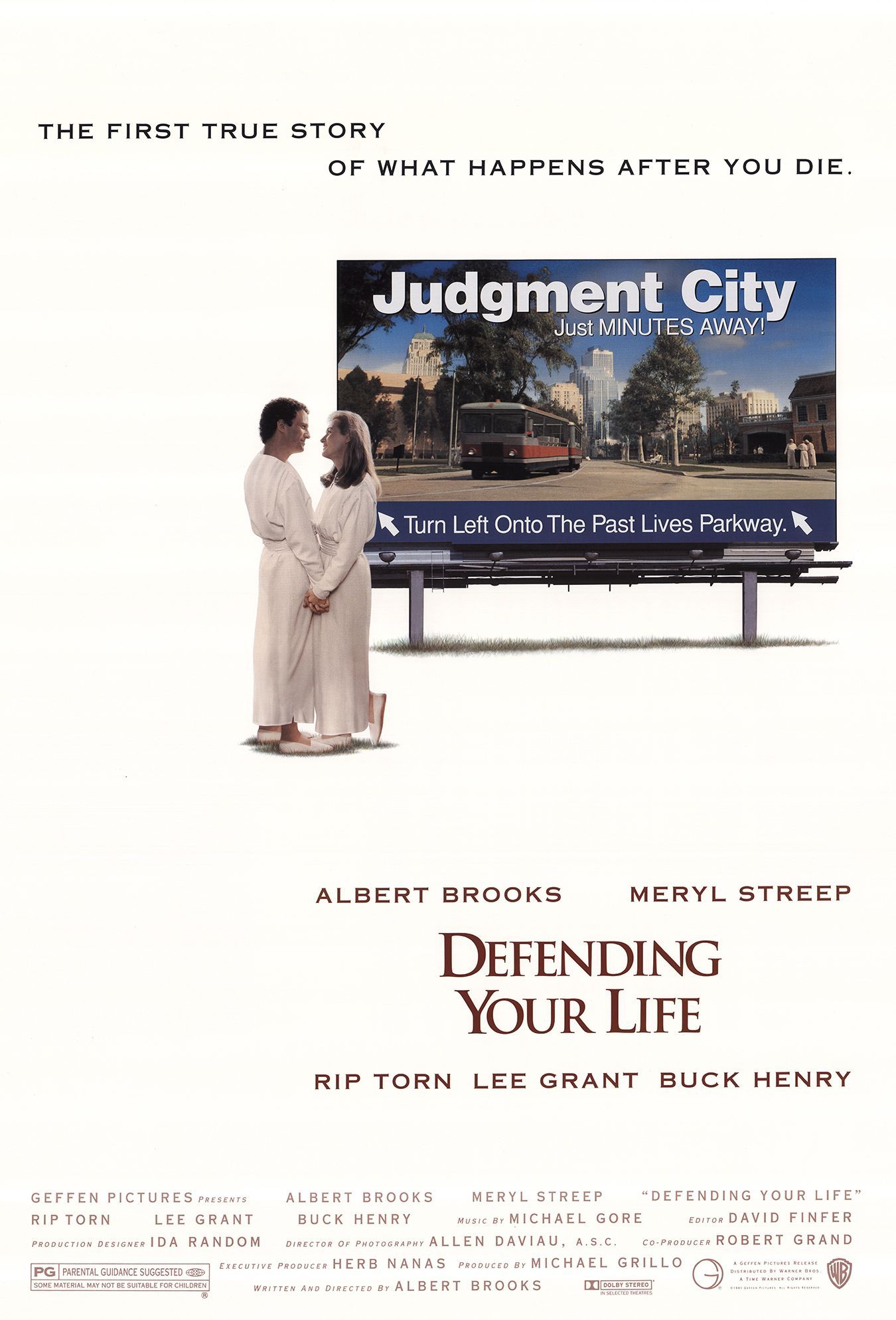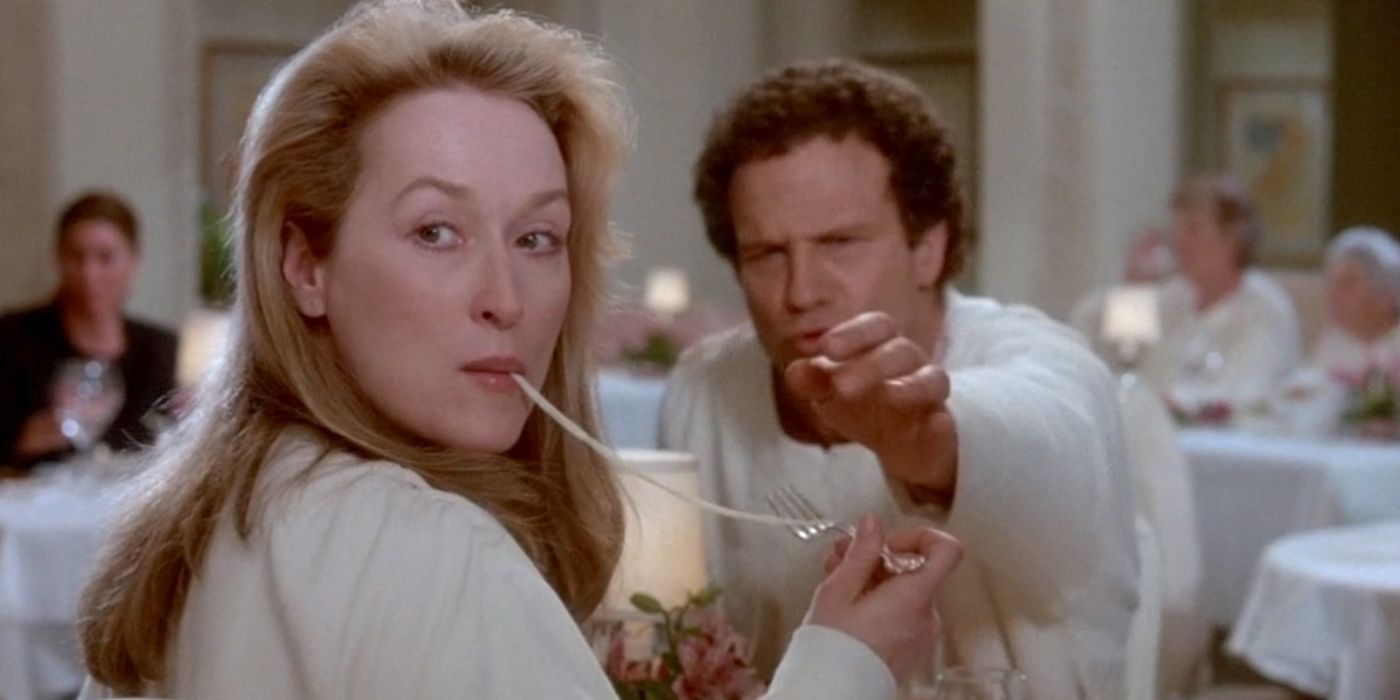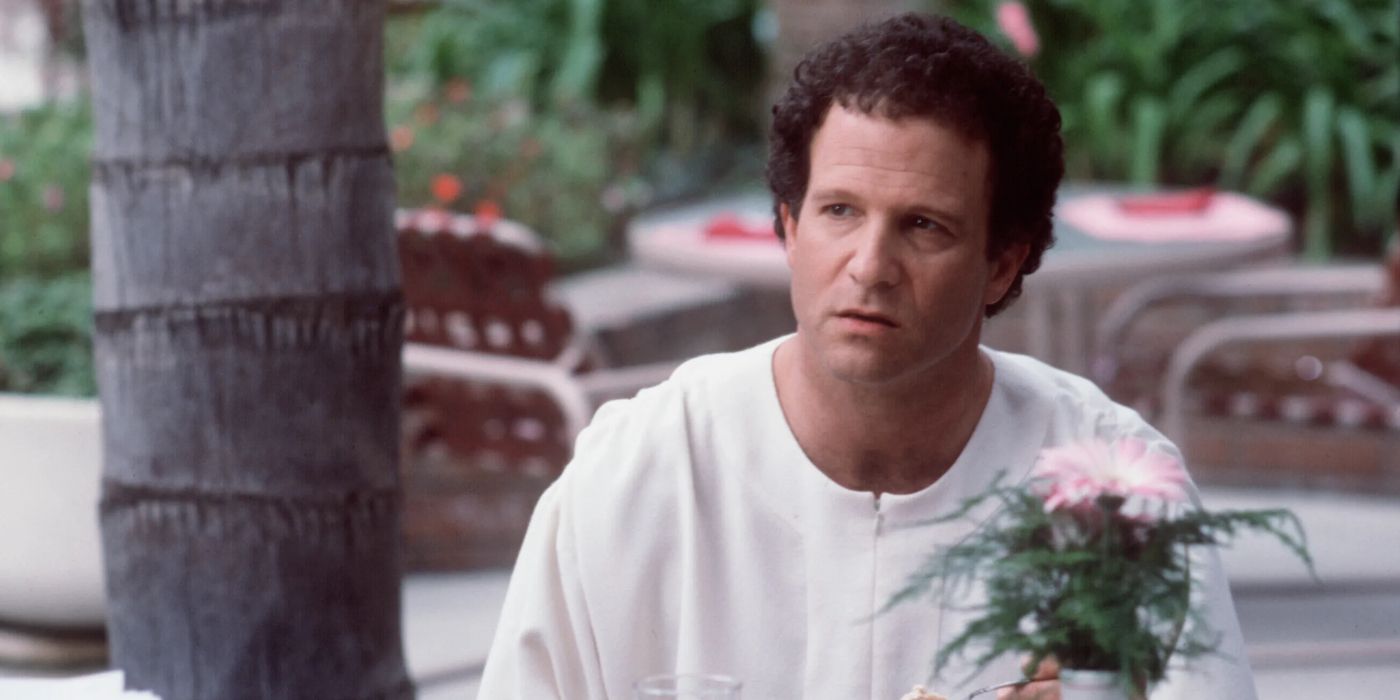The Big Picture
- Defending Your Life satirizes the afterlife, revealing a system that rewards courage based on capitalist values.
- Albert Brooks takes a more sentimental approach in this film, exploring personal redemption and the importance of overcoming fear.
- Meryl Streep's magnetic presence and nuanced elegance add depth to the romance, making Defending Your Life a heartfelt and charming film.
The afterlife, a lofty concept that can be distilled in an everyday conversation with friends, is something we all think about in some form or fashion. Deep contemplation over what happens to your heart and mind when you become deceased is the basis of religion. Portrayals of the afterlife come in all shapes and sizes on the big screen, for both comedic and dramatic effect. Albert Brooks, the renowned actor and stand-up comic who periodically stood in as an auteur filmmaker throughout the '80s and '90s, examined what it means to attain personal redemption as a spirit of the past in Defending Your Life. Amid the film's inquisitive and humorous interpretation of living as a deceased soul in a sequestered utopia, exists a touching romance carried out by Brooks and Meryl Streep.

Defending Your Life
In an afterlife way-station resembling a major city, the lives of the recently deceased are examined in a court-like setting.
- Release Date
- April 5, 1991
- Director
- Albert Brooks
- Cast
- Albert Brooks , Meryl Streep , Rip Torn , Lee Grant
- Runtime
- 112 minutes
- Writers
- Albert Brooks
'Defending Your Life' is a Demonstration of Albert Brooks' Versatile Comedic Skills
From his humble beginnings as a cult favorite with his off-kilter comedy albums, to his unpredictably outrageous appearances on The Tonight Show in the '70s and his successful turn as a reliable character actor, Albert Brooks has been widely recognized as a one-of-a-kind talent. Overshadowed by his distinct breed of ironic humor and neurotic dramatic presence is his pronounced cinematic voice. Each of his seven feature films, all of which he wrote, directed, and starred in, are of a piece with Brooks' vibrant humor. His films, including Real Life, Modern Romance, and Lost in America, observe, often in prescient fashion, the downfalls of society, such as the discontent of American yuppies, media obsession, and the selfish tendencies of men in romantic relationships.
1991's Defending Your Life concludes Brooks' golden age as a filmmaker, and it signaled a lighter side to the acerbic wit that previously saw him predicting the decay of modern culture with the advent of reality television in Real Life and demystifying the American Dream put forward by Easy Rider in Lost in America. The film follows Daniel Miller (Brooks), an advertising executive who is killed in a car accident and transported to a paradisal environment akin to a luxurious retirement community center called Judgment City. This utopia is merely a temporary stay for residents, as it functions as our collective understanding of Purgatory, where a comprehensive legal system determines the fate of new residents. They are either reincarnated back on Earth or sent away for good.
'Defending Your Life' Satirizes the Afterlife
With Defending Your Life, Brooks' ingenuity combines the courtroom drama with a classical, Capra-esque story of human triumph and romance with an additional touch of social commentary. Daniel's trial, where he is defended by his attorney, Bob Diamond (Rip Torn), and faces prosecution from the formidable Lena Foster (Lee Grant), stands to determine whether he lived courageously enough during his lifetime to return to Earth by examining random vignettes of his past life. During his sojourn in Judgment City, Daniel encounters a woman, Julia (Streep), who also awaits trial, and strikes up a romance that reinvigorates him with self-worth.
On the surface, Defending Your Life presents itself as merely a broad satire comedy about the afterlife being a glorified senior citizen community often found in Florida or Arizona. When we become familiarized with Judgment City, a heavenly paradise where your body weight is in a permanent stasis and everyone is free to engage in leisure activities, we learn of the fraught values that drive the city's judicial process. Judgment City rewards citizens who lived courageously on Earth before their demise. If a judge concludes that a defendant overcame their innate fears in the past, they will earn another round in the real world as a reincarnated soul.
However, the city's gatekeeping is not born out of discriminating people of bad character from re-entering the world. Rather, their interpretation of courage is determined by the capitalist-minded exceptionalism that dominated culture in the 1980s. Ultimately, Daniel is punished for not making enough money as an ad executive, especially after he caved during the salary negotiation process with his hiring supervisor. Judgment City does not magistrate the soul. It judges the net worth and self-starter attributes of an American.
'Defending Your Life' Isn't a Typical Albert Brooks Comedy
Albert Brooks, notably in Lost in America, sharply tackled the myths and aspirations of Baby Boomers and the era of American exceptionalism spearheaded by Ronald Reagan. Defending Your Life, literally so, provides the most fatalistic cautionary tale of how America values its people. Throughout the film, Brooks' Daniel is shown to be neurotic and self-involved — much like the majority of his characters. After days of pseudo-court hearings scrutinizing minor blips in his childhood, adolescence, and adult life, he laments the judgmental nature of his existing world, wishing he could just be left alone.
To an extent, the Brooks character archetype is given a taste of his own medicine, as Judgment City is representative of a stringent class divide through the condescending attitude of the city's legal department. Bob Diamond bluntly tells Daniel that he and people of his kind — residents in purgatory — are unintelligent, as they only use a fraction of their brain power, whereas lawyers such as himself maximize the potential of their brain. This lends the film some of Brooks' sharpest humor, notably when Bob shows Daniel that his file consists of binary coding rather than words. Even in the afterlife, Americans are teased with an unattainable level of success that they can only dream of.
Avid fans of Brooks' comedy may have been underwhelmed by the relatively soft touch that molded Defending Your Life, but considering that the film's subject centers around personal redemption in the afterlife, his newfound sentimentality is appropriate. In a conversation with Robert Weide as part of the film's release in the Criterion Collection, Brooks said he purposefully stripped away the religious undertones of the afterlife and used it allegorically to tell a story about overcoming fear rather than engaging in concrete philosophy. The trial sequences, which feature clips of Daniel throughout his life from a third-person narrator's perspective, lend them to trigger earnest reactions from viewers. The jarring and overwhelming sensation that Daniel experiences seeing a younger version of himself projected on the screen is palpable to anyone. Recontextualizing innocuous memories as part of a grand verdict on one's life requires a sincere tone.
Meryl Streep Lends 'Defending Your Life' a Romantic Touch
Luckily, for Brooks to craft his most earnest and sentimental film, he obtained the majesty of Meryl Streep. Albert Brooks and Meryl Streep are unconventional choices for a romantic pair, but their innate dichotomy is essential to Daniel's purgatorial reawakening. It's fitting that Defending Your Life is set in an otherworldly place because Streep's Julia takes on an angelic evocation through her appearance and behavior. She lived a noble life before her freak fatal accident, exemplified when Daniel walks into her trial while the court plays a memory of Julia saving her kids from a house fire. Rather than meticulous scrutiny, the prosecution expresses deep admiration for her heroism. With each day Daniel spends with her, he reaches an epiphany that he can redeem by demonstrating the same courage and high spirit as Julia. Another benefit of Meryl Streep's magnetic presence is that she sells Brooks' sardonic wit with her infectious laugh — an important asset to comedies built upon the personality of its star.
Streep, an underutilized comedic force, especially in this period, is effortlessly charming. Brooks' tender shift as a writer-director in Defending Your Life would feel haphazard without Streep's nuanced elegance anchoring the romance between Daniel and Julia. Her gentle love for Daniel and understated acceptance of her fate make what would be an extraneous subplot essential to Brooks' vision. Rounded out by an unabashedly Hollywood ending, which shows Daniel rushing to Julia as she is transported back to Earth via bus, Defending Your Life aspires to the emotionality of a classic romance story reminiscent of Frank Capra and Ernst Lubitsch. Through the affection of Meryl Streep, Daniel realizes that his life is worth valiantly defending. Who couldn't relate?
When it comes to comedic innovation, the mind of Albert Brooks is unparalleled. By maintaining the cutting humor, shrewd sociological commentary, and manic plot circumstances of his previous films with an untapped sincerity, Defending Your Life amounted to a crowning achievement for Brooks as an actor, writer, and director. Aided by the warmth of Meryl Streep, in another performance that showcases an actor's underutilized abilities, he proved himself as a convincing romantic lead. Brooks' distinct vision of purgatory in Judgment City shows that the afterlife isn't too imposing after all, as long as you just believe in yourself.
Defending Your Life is available for rent or purchase on Amazon Prime Video in the U.S.



